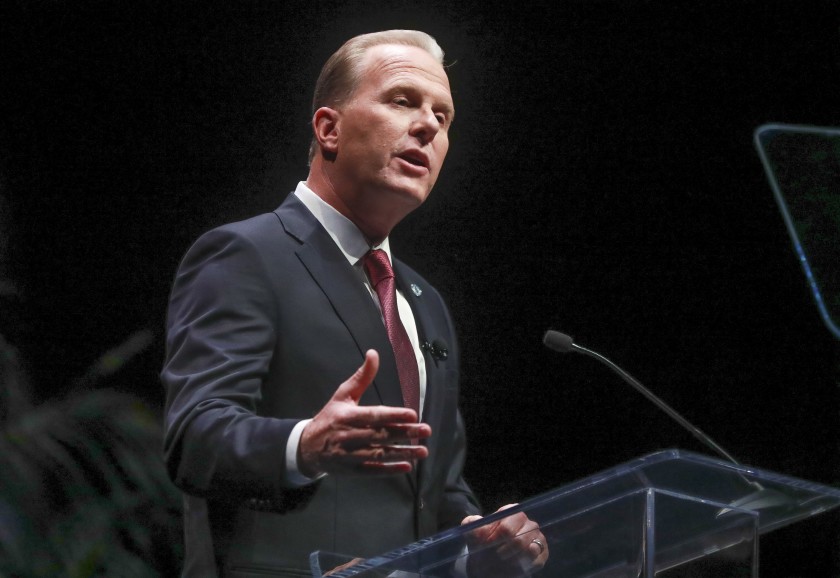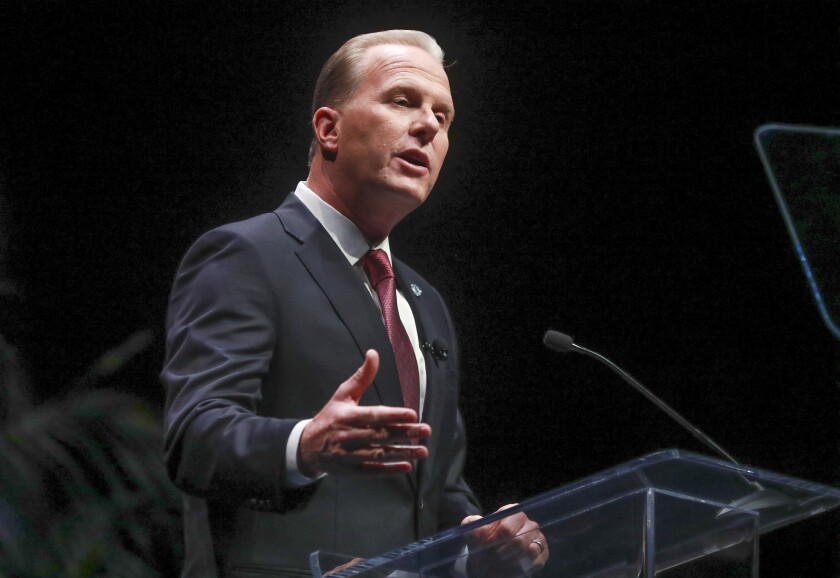Would it be more cost-effective in dealing with homelessness for Californians to repeal Props 47 and 57?

 (Hayne Palmour IV/The San Diego Union-Tribune)
(Hayne Palmour IV/The San Diego Union-Tribune) Our Econometer panel considers Mayor Kevin Faulconer’s push to repeal the laws to deal with homelessness
San Diego, and other California cities, have spent millions of tax dollars on the homeless issue, including shelters, storage facilities and numerous programs.
Mayor Kevin Faulconer advocated in his final state of the city speech for repealing Propositions 47 and 57, which he said are part of the homeless problem. The voter-approved measures reclassified some crimes from felonies to misdemeanors and introduced sentencing credits and modified parole conditions for non-violent and juvenile offenders.
Faulconer said those reforms contributed to homelessness because “folks are not going to change without consequences for their actions.”
Q: Would it be more cost-effective in dealing with homelessness for Californians to repeal Props 47 and 57?
Chris Van Gorder, Scripps Health
NO: If more people are in jail there would probably be less homelessness, but incarceration is most likely more expensive than providing government-supported housing. Having said that, I am deeply worried about the increase in assaults against hospital employees and physicians. I believe that increase is due in part to the early release program in Props 47 and 57, as well as to laws too weak to protect hospital workers against assaults.
Jamie Moraga, IntelliSolutions
YES: Homelessness isn’t just an economic issue, it’s also a public safety and public health issue. While these propositions aren’t the root cause of homelessness, they can create obstacles to solutions. Repealing both propositions could help reduce both crime and homelessness. Not sure on its cost-effectiveness, but with homelessness being such a widespread epidemic in the state we must do everything we can to respond.
Lynn Reaser, Point Loma Nazarene University
NO: Our research indicates that the underlying causes of homelessness often are found in early childhood where children experience mental or emotional abuse, frequent moves, and school expulsion. These issues often culminate in low education, substance abuse, mental illness, and homelessness. The mayor’s proposals to increases services for mental health and substance abuse are constructive. However, while there may be other reasons to repeal the two propositions, they probably have little or no effect on homeless costs.
Phil Blair, Manpower
NO: Putting people who commit low-level crimes, be it homeless or housed people, is not the solution. According to the California Legislative Analyst’s Office it costs $81,000 per year to keep someone in prison. Instead of again making low-level crimes committed by homeless people felonies we should be hiring social workers, opening transitional shelters, having more mental health beds and developing a long-term housing solution. Other than serious criminals, we know that prison time does nothing but harden prisoners and make the public feel slightly safer, both of which come with a very high price tag and are ineffective.
Alan Gin, University of San Diego
NO: Incarcerating people has always been one of the more expensive ways to deal with problems. One example is that the cost to keep someone in prison for a year is higher than the cost to educate them. Repealing Propositions 47 and 57 could actually make the homelessness situation worse. Making some crimes felonies instead of misdemeanors and toughening sentences and parole conditions may make it more difficult for people to get jobs after finishing their sentences, which would affect their ability to afford housing.
Kelly Cunningham, San Diego Institute for Economic Research
YES: Decriminalizing property crimes and releasing convicted criminals from custody resulted in thousands of addicts and mentally ill trading life behind bars to churning cycles of homelessness, substance abuse and petty crime. Reducing penalties significantly resulted in increased property crimes and other acts of violence, while fewer drug addicts got treatment and continued stealing to sustain their harmful habits. Whatever millions of dollars were purportedly saved in prison costs were regrettably not used to rehabilitate inmates.
Gary London, London Moeder Advisors
NO: I believe that whether certain crimes associated with homelessness are considered a felony or a misdemeanor is distracting from a very complicated problem. Aside from the fact that such an effort will undoubtedly be costly, because it would jail more newly minted felons, it doesn’t touch on treatment and rehab. Better for the public to make an investment to open mental health institutions.
Austin Neudecker, Rev
NO: Props 47 and 57 were adopted to reduce the severity of punishment for non-violent criminals. Even if this leads to more homelessness, the solution is not to return to severe punishments, but improve the options for rehabilitation and reintroduction into society. Let’s address the underlying problems causing crime and homelessness through rehabilitation rather than a purely punitive system. Jail is extremely expensive with a high recidivism rate while rehabilitation pays long-term dividends.
James Hamilton, UC San Diego
NO: It doesn’t make sense to incarcerate drug addicts from the perspective of either economics or social justice. But decriminalizing drug possession and minor theft is not the answer, either. We need laws that enable us to force people with mental illness and severe addiction problems to get help and to keep them off the streets until they are ready to function as contributing members of society.
David Ely, San Diego State University
NO: Multiple factors are responsible for rising homelessness in California. Therefore, reducing homelessness will require that state and city leaders pursue multiple approaches to address all of the underlying factors. Emphasizing only a few approaches that appear to be cost-effective will have a limited impact. Perhaps revisions to Props 47 and 57 could contribute toward a solution, but it is not at all clear that this is an attractive approach purely from a cost perspective.
Bob Rauch, R.A. Rauch & Associates
YES: Tough love is the solution to defeat homelessness. Repeal Props 47 and 57 and enforce existing laws against street loitering, camping, littering, defecating, urination, illicit drug use and petty theft. Homeless can have a choice to reside in a tent or camp like the proposed Sunbreak Ranch, which would include dedicated teams of mental health professionals, drug rehabilitation specialists and vocational trainers, or go to jail.
Norm Miller, University of San Diego
NO: Increased criminalization of homelessness will not solve the problem, in my opinion, nor will it be cost-effective. Most studies suggest that social counseling and non-housing assistance that compliments housing assistance will be far more effective. In some cases drug counseling is needed. In other cases, job training and skill-enhancements along with some personal finance counseling are more cost-effective.
Have an idea for an EconoMeter question? Email me at phillip.molnar@sduniontribune.com.
 Pathways Drug Rehabilitation Luxury Addiction Treatment & Detox Center
Pathways Drug Rehabilitation Luxury Addiction Treatment & Detox Center


